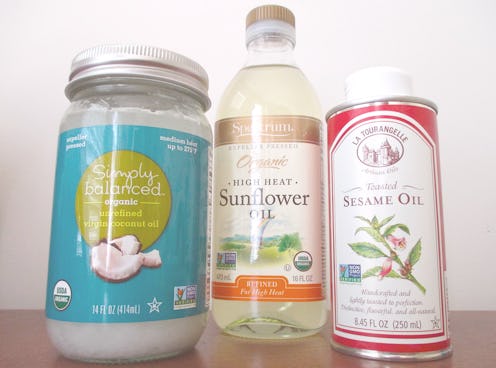Fashion
I Tested 3 Oils To Find Which Is Best For Pulling

Even though oil pulling has been around for millennia, it's having a major moment. But with more than just coconut oil on the market, which type of oil is actually best for oil pulling? Three of the most recommended are sesame oil, sunflower oil, and (of course) coconut oil. Well, I wanted to see if there were any discernible differences among the three, so I tried pulling each type of oil so you don't have to. But before we get to the tastes and textures, let's talk about how the health benefits differ.
Traditionally, sesame oil is one of the most highly recommended by natural beauty enthusiasts. And with good reason, as it has seemingly the highest antibacterial properties that can prevent plaque, tooth decay, and gingivitis, according to Michelle Hurlbutt, RDH, MSDH in an interview with Huffington Post. Sunflower oil also has antibacterial properties that help prevent gingivitis. However, while coconut oil also has these antibacterial properties, the lauric acid in it also allows it antimicrobial properties, which can help against viruses and fungi, according to Huffington Post.
Because all three types of oils are meant to help with teeth whitening, and I don't have ways to measure how effective each is against gingivitis and tooth decay, I instead simply tested each oil for pleasantness of use and how well it seemed to clean my teeth. I usually wake up with a sort of awkward film over my teeth, so I made sure to oil pull first thing in the morning before eating or drinking anything. Let's see how each type fared, and get up-close-and-personal with my teeth.
For the following photos, the "before" is on the left, and the "after" is on the right.
Coconut
Whether or not you've ever put oil in your mouth before, the weirdest part about using coconut oil is that (if stored properly somewhere below 75 degrees) it starts out as a solid. Although I later learned that I actually preferred this initially-solid state to the other oils, having oil melt in my mouth was definitely an odd experience. And because I do love coconut, the subtle coconut flavor was quite enjoyable for me. If you're indifferent to coconut, the taste was faint enough that it probably won't bother you. However, if you really despise the taste of coconut, you might want to try adding a drop of peppermint oil before pulling, or just using a different type of oil.
As far as how well my teeth were cleaned, the film was completely swished away after 20 minutes, and my teeth were left feeling smooth and clean.
Sesame
OK. I actually quite like the flavor of sesame seeds. But this oil was bad. I did not enjoy any of the time this sesame oil was in my mouth, and would definitely recommend using some other essential oil to counteract the taste. Granted, the flavor on my particular oil is marketed as "extra bold" because the only sesame oil I could find was toasted. So if you can get your hands on some plain ol' sesame oil, the taste probably isn't as intense. And although it still clearly felt like oil in my mouth, the texture of this was thinner than the coconut or sunflower oil.
Likewise with the coconut oil, after 20 minutes, that awkward film was gone, and my teeth felt smooth and clean.
Sunflower
I was quite surprised when pulling sunflower oil, because it tasted like... well, nothing. Although the texture was somewhat thicker than sesame oil, if I didn't have a taste preference for coconut, this would be my choice for oil pulling. Of course, if you prefer no flavor, or want a blank canvas for adding a preferred essential oil, I would recommend sunflower oil over coconut or sesame oil.
And just like the others, 20 minutes did away with the film and made my teeth feel smooth and clean.
Which Oil Wins The Pulling Contest?
When you decide what type of oil you want to use for oil pulling, keep in mind the health benefits, tastes, and textures that you prefer to help pick what is best for you. Coconut oil was my personal favorite because I enjoyed the taste and I like that it also has antimicrobial properties. But of course, you don't have to choose just one. Rotating oils is always an option if you want to reap more benefits than what just one has to offer, or if you simply want to switch up flavors. Regardless of which one(s) you choose though, pulling any of these oils properly is better than not pulling one at all.
Images: Miki Hayes